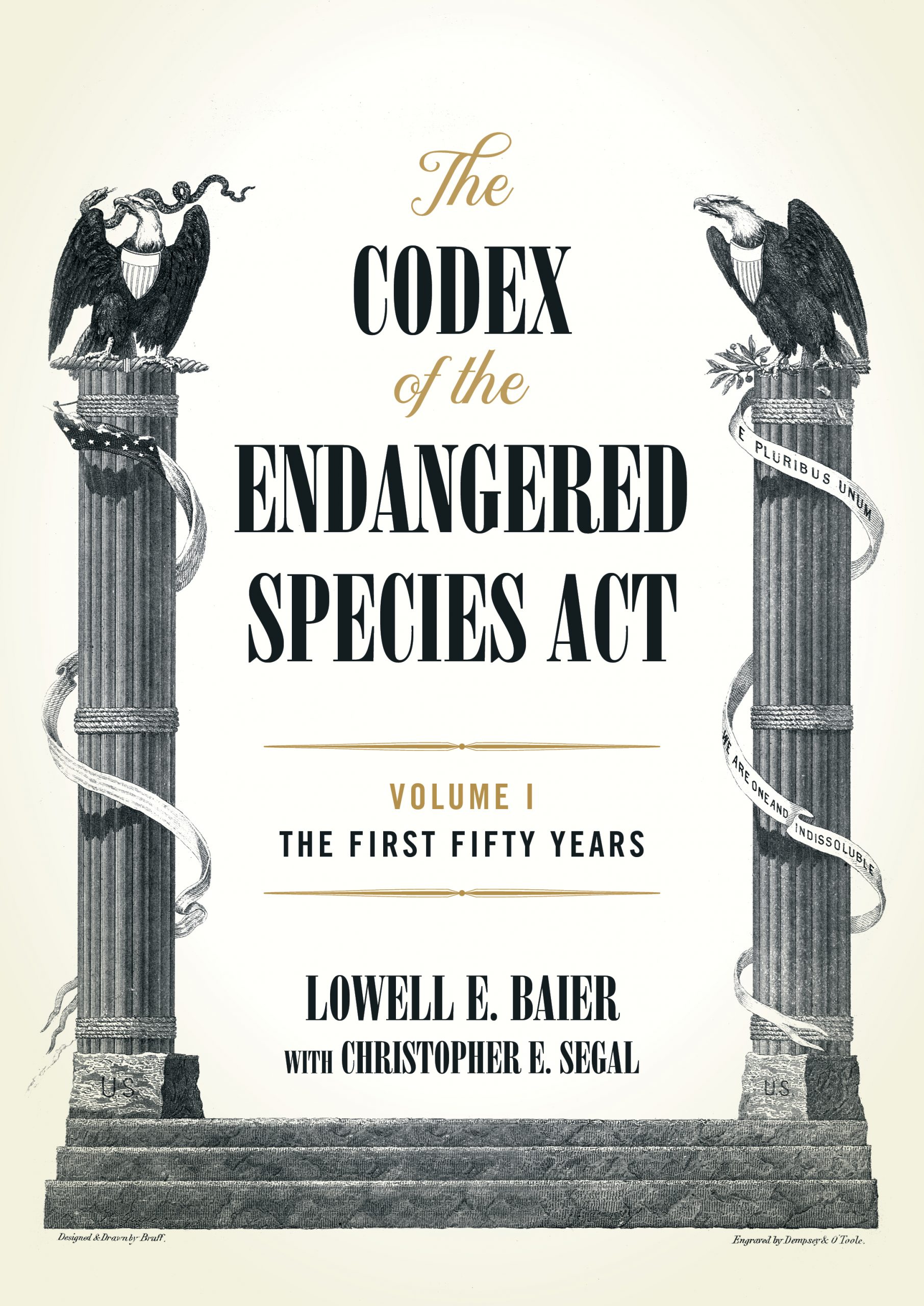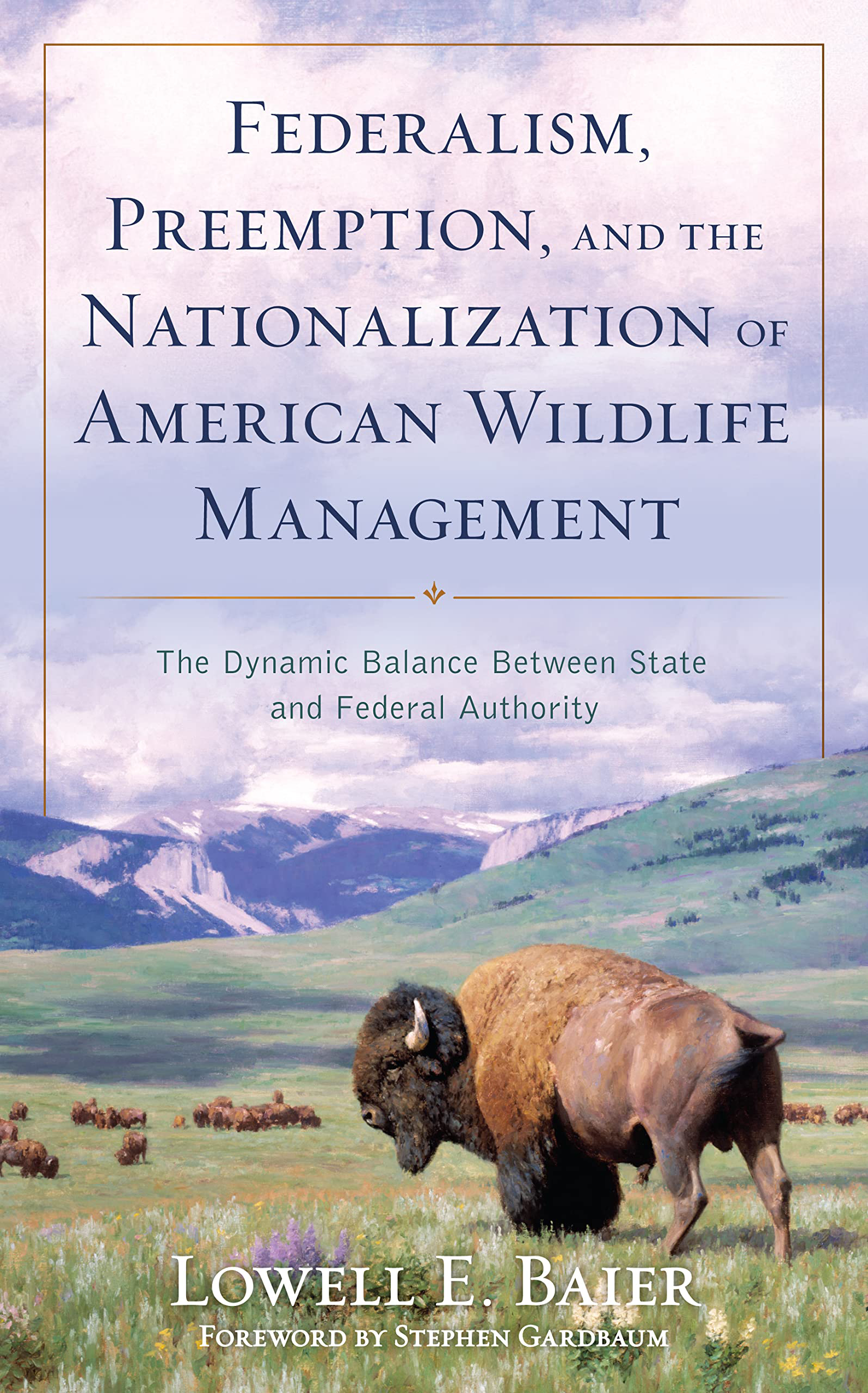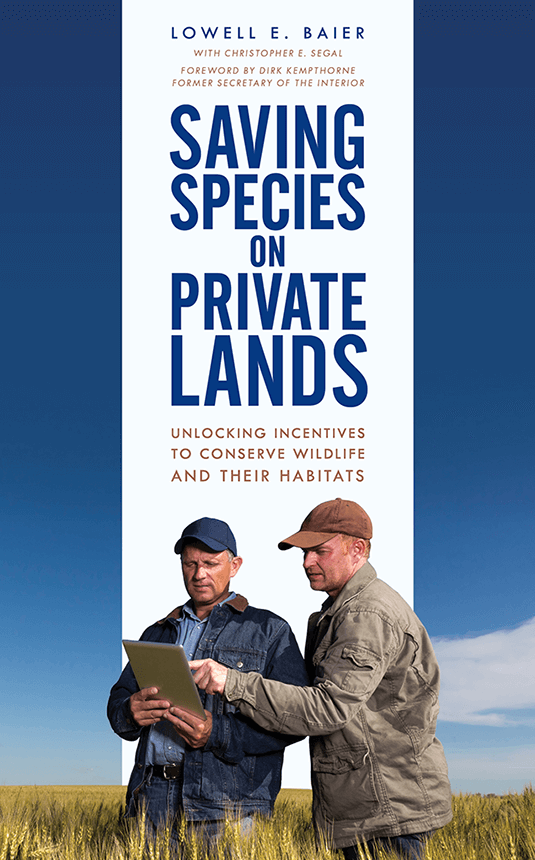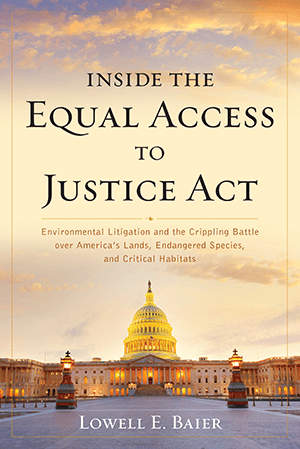The Codex of the Endangered Species Act, Volumes I & II
By Lowell E. Baier with Christopher E. Segal
Forthcoming April 22, 2023
The Endangered Species Act of 1973 (ESA) is one of the most cherished and reviled laws ever passed. It mandates protection and preservation of all the nation’s species and biodiversity, whatever the cost. It has been a lightning rod for controversy and conflicts between industry/business and environmentalists.
The year 2023 marks the 50th anniversary of the ESA. It is also another year in an ongoing crisis of biodiversity loss, species extinctions, climate change, and natural disasters. Conservationist, environmental historian, author, and attorney Lowell E. Baier brings to life the stark choice that now faces America and the world: act to save our vanishing natural world or risk the consequences.
This is not a hopeless choice. Through a combination of original research spanning the history of American wildlife conservation and the last 50 years of the ESA; new research and bold proposals for the future of the ESA; and a year-long series of events, Baier is joined by over two dozen ESA scholars, practitioners, and policy experts with a bold vision for the future of the ESA and wildlife conservation in America.
Volume I: The First 50 Years
By Lowell E. Baier with Christopher E. Segal
This is the first comprehensive, single-volume history of the Endangered Species Act of 1973. It covers the entire history of the law, including how it arose as a response to the environmental movement of the 1960s-70s and the threat of species extinction, and represented both a continuation of and a break from the tradition of wildlife conservation pioneered by sportsmen and state fish and wildlife agencies. The history of the ESA since 1973 is traced in a historiographic manner, including the major legislative, judicial, and administrative events around the law, together with the economic and societal influence of each era. Analysis of contemporary challenges such as funding, collaboration, state-federal relations, species delisting, and the biodiversity crisis known as the “sixth great extinction” are all included, making this book a complete reference for any student, legislator, program administrator, landowner, or member of the public who wants to know about the ESA and be prepared for the next 50 years.
Volume II: The Next 50 Years
Edited by Lowell E. Baier, John F. Organ, and Christopher E. Segal
Just as the ESA has had a long and successful history, it also has a bright future. In this volume, over twenty-five expert authors, including ESA practitioners, scholars, and policy experts, come together to prescribe a future path for a more effective, and less controversial, ESA. Their recommendations span the spectrum of available tools: legislative, regulatory, administrative, and voluntary. There is something for everyone in this book: if the ESA affects you, there is something that you, or your partners in the government and nonprofit communities, can do to resolve conflicts, complete objectives, and conserve wildlife.
The book explains the latest science and innovations in wildlife conservation, including in habitat management, species genetics, land use planning, and more. It brings to life the human element, drawing on the fields of human dimensions science, conflict-resolution, and collaborative conservation. It is a reference book for scientists, administrators, practitioners, Congress, and future presidential administrations to rely on going forward, providing a road map for the next 50 years of the Endangered Species Act.
Federalism, Preemption, and the Nationalization of American Wildlife Management: The Dynamic Balance Between State and Federal Authority
By Lowell Baier | March 30, 2022
Environmental law expert Lowell E. Baier reveals how over centuries the federal government slowly preempted the states’ authority over managing their resident wildlife. Wildlife management today has become fraught with tension over the appropriate roles for federal, state, and private actors, who should be responsible for conservation, and how it should be funded. The book places these conflicts in their appropriate historiographic contexts, showing how they glacially emerged over time, and how the legislative, executive, and judicial branches of our government all contributed to the growing problem.
The book offers solutions as well, exploring how increased funding, partnerships rather than partisanship, and a renewed commitment to our federalist tradition offer the promise of a more secure future for our wildlife, and ourselves.
In this essential volume, Baier educates elected officials, wildlife students, and environmentalists in both the precedents that led to the current state of wildlife management, and how a constructive environment can be fostered at all levels of government to improve our nation’s wildlife and biodiversity.
AWARDS
Winner, 2022 New York City Big Book Award in the Environment Category
Winner, 2022 New York City Big Book Award in the Political Category
Finalist, 2022 Next Generation Indie Book Award in the Science/Nature/Environment Category
Finalist, 2022 Next Generation Indie Book Award in the Historical Non-Fiction Category
Saving Species on Private Lands: Unlocking Incentives to Conserve Wildlife and Their Habitats
By Lowell E. Baier with Christopher E. Segal | Mar 10, 2020
Winner, Independent Press Award - Conservation/Green, 2021
By Lowell Baier | March 30, 2022
In this practical handbook, Lowell E. Baier explores the best hope for successful conservation of America’s threatened, endangered, and at-risk wildlife – voluntary, cooperative partnerships that focus on private land, where over 75% of at-risk species can be found. Private landowners form the bedrock of these partnerships, and they have a long history of rising to meet the challenge of conservation. But they can’t do it alone.
This book is a guide for private landowners who want to conserve wildlife. Whether engaged in farming, ranching, forestry, mining, energy development, or another business, private working lands all have value as wildlife habitat, with the proper management and financial support. This book provides landowners and their partners with a roadmap to achieve conservation compatible with their financial and personal goals.
The book introduces the art and language of land management planning as well as regulatory compliance with laws such as the Endangered Species Act of 1973. It categorizes and explains the tools used by wildlife professionals to implement conservation on private lands. Moreover, it documents the multitude of federal, state, local, and private opportunities for landowners to find financial and technical assistance in managing wildlife, from working with a local NGO to accessing the nearly $6 billion per year available through the federal Farm Bill.
AWARDS
Short List, 2021 The Wildlife Society Annual Publication Award (One of five books so recognized)
Winner, 2021 New York City Big Book Award in the Nature Category
Winner, 2021 Eric Hoffer Book Award in the Business Category
Winner, 2021 Independent Press Book Award in the Green/Conservation Category
Winner, 2020 Next Generation INDIE Book Awards, Best Non-Fiction E-book
Inside the Equal Access to Justice Act: Environmental Litigation and the Crippling Battle over America's Lands, Endangered Species, and Critical Habitats
By Lowell E. Baier | Mar 17, 2020
Next Generation INDIE Book Awards Grand Prize Winner, Best Non-Fiction Book in 2017; and Winner in the Science/Nature/Environment category
Finalist for Foreword INDIES Book of the Year Awards in Ecology and Environment
In this book, Lowell Baier, one of America’s preeminent experts on environmental litigation, chronicles the century-long story of American natural resources management, focusing on litigation, citizen suits, and attorneys’ fees. He provides the first book-length comprehensive examination of the little-known 1980 Equal Access to Justice Act (EAJA), and its role in environmental litigation. Originally intended to support veterans, the disabled, and small businesses, EAJA, Baier argues, now paralyzes America’s public land management agencies. Baier introduces readers to the history of EAJA, examines the many beneficiaries of the law, describes in depth 20 of the most prominent litigious environmental groups in America, and recommends carefully tailored amendments to EAJA to correct environmental abuses of the law while protecting legitimate interests.
In 2019, at the urging of Baier and with his book and Congressional testimony as evidence, Congress responded by passing the John D. Dingell, Jr. Conservation, Management, and Recreation Act, which included an amendment to the Equal Access to Justice Act that has brought transparency to the law and restored part of the original intent of Congress to the law. Inside the Equal Access to Justice Act is a valuable resource for the environmental legal community, environmentalists, practitioners at all levels of government, and all readers interested in environmental policy and the modern administrative state.
AWARDS
Winner, 2017 Next Generation INDIE Book Awards Grand Prize for Best Non-Fiction Book
Winner, 2017 Next Generation INDIE Book Awards in the Science/Nature/Environment Category
ENDORSEMENTS
Lowell Baier has been a lifelong champion for conservation carrying on the legacy of President Teddy Roosevelt, and this book on America’s lands litigation is a must read for all who care about the conservation of our wonderful national crown jewels.
We have here a book of truth and power. Lowell Baier in his thoughtful and powerful publication shows our history—first of abuse and more recently of our effort to protect this magnificent country and world.
This masterful work of scholarship flawlessly proves that today’s new paradigm of cooperative conservation and federalism in endangered species conservation is a far more responsible endeavor with measurable results than can ever be achieved by combative saturation litigation and court intervention.
Today, a new conservation paradigm is sweeping across America. Federal, state, local government agencies, foundations, non-profits, and willing landowners are joining together to find win-win solutions that keep working lands productive and American workers employed while conserving more of our habitat and wildlife than ever before. This book explains how and why they work, and how they can be put to work by landowners across the nation. I recommend this as a must read for private landowners desiring to successfully navigate the ESA!
At a time when more than one-third of all U.S. species are at heightened risk of extinction, incentivizing habitat restoration on private lands has never been more important. That’s easy to say, but incredibly hard to do. Thankfully, Lowell Baier has charted a clear path forward that will unleash the collaborative conservation desperately needed to recover the full diversity of fish, wildlife, and plants for future generations.
American wildlife management law for over two centuries has been a crucible in which the evolution of American federalism was forged. Lowell Baier’s sweeping, accessible account of that history comprehensively and insightfully assesses its conflicts and tensions. This masterful history is indispensable reading for anyone engaged in the conversation about the future of our nation’s wildlife and habitat conservation federalism.
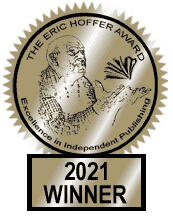 Saving Species on Private Lands: Unlocking Incentives to Conserve Wildlife and Their Habitats was recently recognized by the Eric Hoffer Award. The book was named the winner of the Business category and a finalist for the Eric Hoffer Award’s Grand Prize and for the Montaigne Medal, which is awarded to the most thought-provoking book.
Saving Species on Private Lands: Unlocking Incentives to Conserve Wildlife and Their Habitats was recently recognized by the Eric Hoffer Award. The book was named the winner of the Business category and a finalist for the Eric Hoffer Award’s Grand Prize and for the Montaigne Medal, which is awarded to the most thought-provoking book.
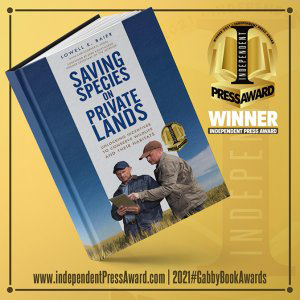 Saving Species on Private Lands: Unlocking Incentives to Conserve Wildlife and Their Habitats was recently recognized by the Independent Press Award. The book, which is a guide for private landowners who want to conserve fish and wildlife on their lands, was named the 2021 winner of the Conservation/Green category.
Saving Species on Private Lands: Unlocking Incentives to Conserve Wildlife and Their Habitats was recently recognized by the Independent Press Award. The book, which is a guide for private landowners who want to conserve fish and wildlife on their lands, was named the 2021 winner of the Conservation/Green category.
 Saving Species on Private Lands: Unlocking Incentives to Conserve Wildlife and Their Habitats was recently named a 2020 Next Generation Indie Book Award winner by the Independent Book Publishing Professionals Group, taking home a win in the E-Book (Non Fiction) category and named a finalist for best book in the Nature/Environment category.
Saving Species on Private Lands: Unlocking Incentives to Conserve Wildlife and Their Habitats was recently named a 2020 Next Generation Indie Book Award winner by the Independent Book Publishing Professionals Group, taking home a win in the E-Book (Non Fiction) category and named a finalist for best book in the Nature/Environment category.

